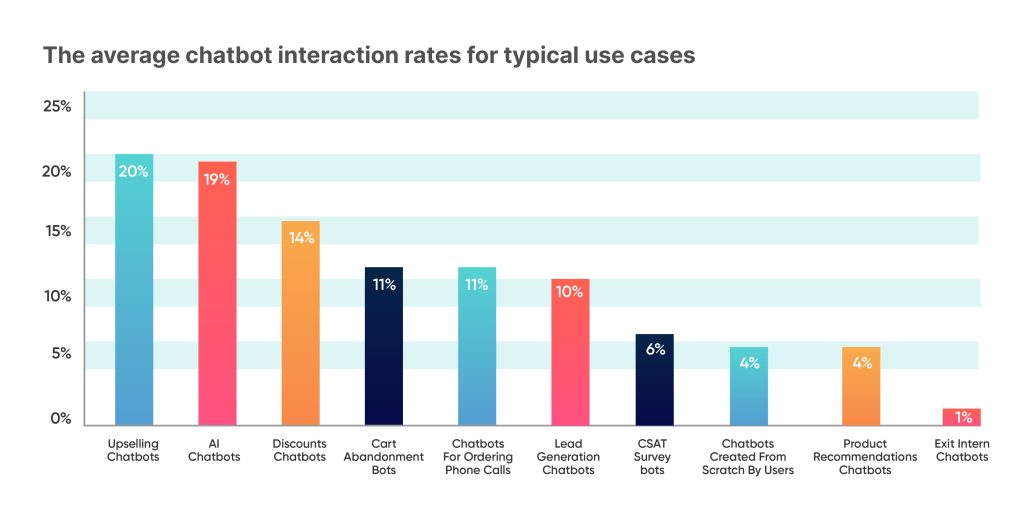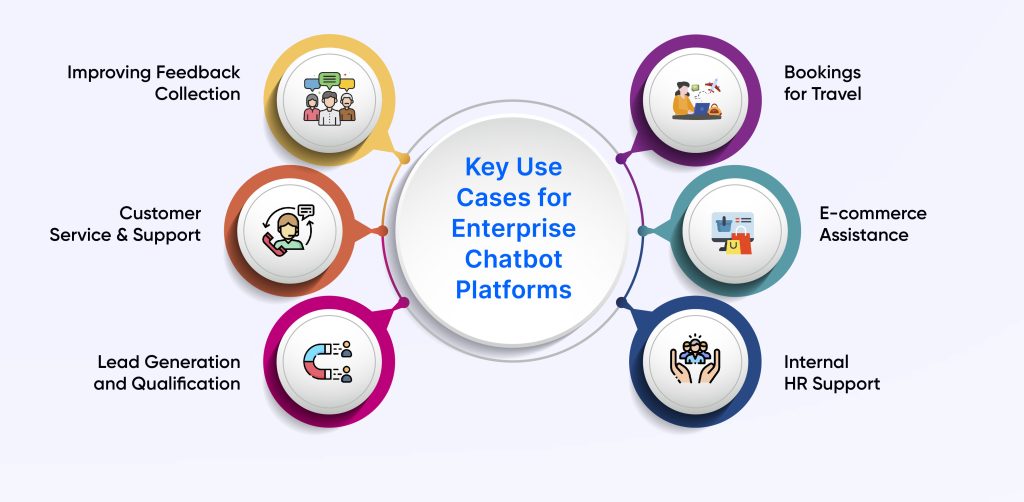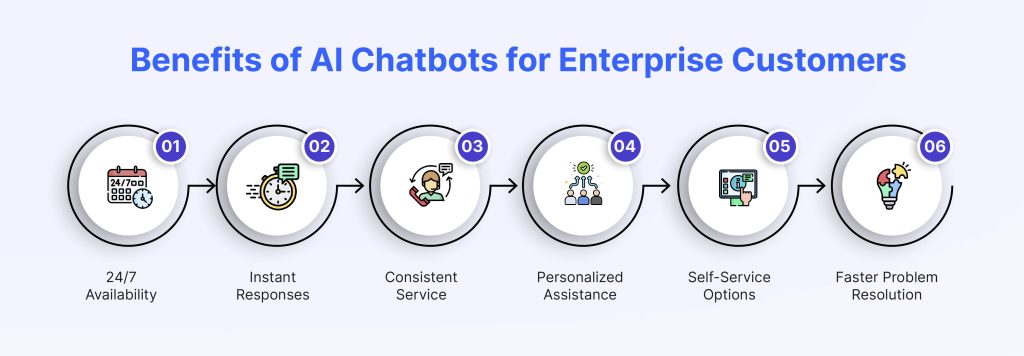When teams operate independently, it creates communication gaps that can lead to disorder. In contrast, when teams collaborate, they tend to be more efficient.
According to a recent survey, chatbots are used by 22% of microbusinesses, 20% of small businesses, 11% of medium-sized businesses, and 12% of large firms.
From 2020, the number of customers using chatbots for customer assistance has doubled. In the meantime, phrases like “generative AI,” “AI chatbot,” and “AI customer service” have gained popularity in the corporate world.
It’s obvious that chatbots are here to stay, like it or not. Furthermore, they have a lot of positive effects on both consumers and organizations when utilized properly.
This is particularly valid for larger, enterprise-level businesses. Large numbers of consumer requests can be automatically handled by enterprise chatbots, which can also serve as virtual assistants.
Gartner defines chatbots as “A domain-specific conversational interface that uses an app, messaging platform, social network or chat solution for its conversations.”
Intelligent and complex systems designed to cater to the requirements of sizable companies or organizations are known as enterprise chatbots. These sophisticated artificial intelligence technologies—such as generative AI, natural language processing, and conversational AI—power these bots, which are made to converse with users in a manner that is human-like.
Enterprise AI Chatbots are intelligent virtual assistants designed to simulate human-like conversations and perform tasks autonomously. Unlike traditional rule-based chatbots, which follow predefined scripts, AI chatbots utilize advanced AI techniques such as natural language processing (NLP), machine learning (ML), and deep learning to understand and respond to user queries in real-time. These chatbots can handle complex interactions, learn from user feedback, and continuously improve their performance over time.
Enterprise AI Chatbots are revolutionizing media interactions, reshaping content delivery, and enhancing audience engagement through personalized experiences, showcasing the profound impact of AI on media dynamics.
They are particularly useful in the field of digital customer care, even though they can be utilized internally to help staff members. Enterprise chatbots function as virtual agents for customers, offering automated support and prompt responses day or night.

Enterprise AI chatbots leverage natural language processing (NLP) and machine learning (ML) to understand user queries, retrieve relevant information, and generate responses, enabling efficient automation of customer interactions and support tasks.

NLP is a key component of AI chatbots that enables them to understand and interpret human language. Through NLP algorithms, chatbots analyze user input, identify the intent behind the message, and extract relevant information to generate appropriate responses.
ML algorithms power the learning capabilities of AI chatbots, allowing them to improve performance based on experience and feedback. By analyzing large datasets of user interactions, chatbots can learn to recognize patterns, adapt to user preferences, and provide more accurate responses over time.
Dialog management is the process of managing the flow of conversation between the user and the chatbot. AI chatbots use dialog management techniques to maintain context, handle multi-turn conversations, and guide users through interactions seamlessly.
AI chatbots are often integrated with backend systems such as customer relationship management (CRM) software, enterprise resource planning (ERP) systems, and databases. This integration enables chatbots to access and retrieve relevant information in real-time, such as customer data, product details, or transaction history.
Once the user’s intent is identified and relevant information is retrieved, the chatbot generates a response tailored to the user’s query. This response may include text-based messages, rich media content, links to resources, or actions such as placing orders or scheduling appointments.
Enterprise chatbot platforms have become indispensable tools for businesses across various industries due to their versatility and ability to streamline processes, enhance customer experiences, and improve operational efficiency. According to the State of the Connected Customer Report, 83% of customers expect to interact with a company right after visiting its website. A chatbot can help fill this gap. The enterprise chatbot solution seamlessly integrates AI technology to optimize customer interactions and streamline business processes.
Here are some key use cases for enterprise chatbot platforms:

Chatbots are able to actively gather user input and evaluate client mood while interacting. This gives organizations insightful information about how customers perceive them and enables them to enhance their products, services, and customer support systems more specifically.
Chatbots can handle routine customer inquiries, such as FAQs, order tracking, and product information, freeing up human agents to focus on more complex issues. They provide 24/7 support, ensuring prompt responses to customer queries and enhancing overall customer satisfaction. Integrating AI in Customer Experience through enterprise chatbots enhances engagement, personalization, and efficiency, fostering seamless interactions between businesses and their clientele.
Chatbots can engage website visitors in personalized conversations, gather information about their needs and preferences, and qualify leads based on predefined criteria. This helps businesses identify potential customers and route them to the appropriate sales representatives for further follow-up.
Companies in this industry can utilize corporate bots to act as virtual travel agents or concierges, helping with online reservations, reservation administration, trip planning, grievances, and more. They can also give travelers advice or information on their destinations, as well as real-time updates during their travels.
Chatbots can assist customers with product recommendations, sizing information, and purchase decisions. By simulating the experience of interacting with a knowledgeable sales associate, chatbots can improve conversion rates and drive sales for e-commerce businesses.
Chatbots can assist employees with HR-related inquiries, such as benefits enrollment, time-off requests, and policy information. They can automate administrative tasks and provide quick access to relevant resources, improving employee satisfaction and reducing the burden on HR departments.
AI chatbots offer numerous benefits for enterprise businesses across various industries. Here are some key advantages:
Actually, AI chatbots can independently manage up to 80% of inquiries, which results in a 30% reduction in customer support expenses.
The fact that enterprise chatbots reduce operating costs is one of their biggest features. This is due to their ability to automate a large number of repetitive support jobs and customer care requests. By automating repetitive tasks and handling routine inquiries, AI chatbots can reduce the need for human intervention, leading to significant cost savings for businesses. They can handle a large volume of inquiries at a fraction of the cost of employing human agents, making them a cost-effective solution for customer support and other functions.
AI chatbots can provide round-the-clock support to customers, employees, and stakeholders, ensuring that inquiries are addressed promptly regardless of the time zone or location. This availability enhances customer satisfaction and improves operational efficiency. Moreover, Building upon an AI foundation model, Enterprise AI Chatbots are empowered to understand complex queries and provide accurate responses, thereby optimizing customer interactions and streamlining business processes.
AI chatbots can handle a large volume of inquiries simultaneously, making them highly scalable. As business operations grow, chatbots can adapt to handle increased demand without requiring additional resources, enabling businesses to scale efficiently.
AI chatbots can streamline workflows and processes by automating tasks such as data entry, appointment scheduling, and information retrieval. By freeing up human employees from mundane tasks, chatbots enable them to focus on more complex and value-added activities, improving overall productivity and efficiency.
Advanced AI algorithms enable chatbots to analyze user data and provide personalized recommendations and responses. By understanding user preferences, behavior, and history, chatbots can deliver tailored experiences that enhance customer satisfaction and engagement.
AI chatbots offer several benefits for enterprise customers, enhancing their overall experience and satisfaction. Here are some of the key advantages:

AI chatbots provide round-the-clock support, allowing customers to access assistance and information at any time, regardless of business hours or time zones. This ensures that customers can get help whenever they need it, leading to increased convenience and satisfaction.
AI chatbots can provide instant responses to customer inquiries, eliminating the need for customers to wait in queues or navigate through complex automated phone systems. This quick response time improves efficiency and reduces frustration for customers.
AI chatbots deliver consistent service and information across all interactions, ensuring that customers receive the same level of assistance and support regardless of the channel or touch point they use. This consistency builds trust and reliability with customers. Moreover,exploring innovative business ideas, such as leveraging Enterprise AI Chatbots for automated customer service and data analysis, can revolutionize operational efficiency and enhance customer satisfaction.
Advanced AI algorithms enable chatbots to analyze customer data and provide personalized recommendations and solutions based on individual preferences, behaviors, and past interactions. This personalized assistance enhances the customer experience and increases engagement.
AI chatbots empower customers to find answers to their questions and solve problems on their own through self-service options. By providing access to a knowledge base or FAQs, chatbots enable customers to resolve issues independently, saving time and effort for both the customer and the business.
AI chatbots can quickly diagnose issues and provide solutions, reducing the time it takes to resolve customer problems. By automating routine inquiries and tasks, chatbots free up human agents to focus on more complex issues, thereby accelerating problem resolution and improving overall customer satisfaction. With their ability to analyze data and learn from interactions, AI chatbots continuously enhance their problem-solving capabilities, ensuring efficient and effective support for customers around the clock.
Did you know that 24% of organizations worldwide utilize chatbots? Chatbots lessen the workload of customer service professionals, automate customer support operations, and even save them money.
Using enterprise chatbots for customer engagement and support requires careful planning and implementation to ensure effectiveness and customer satisfaction. Here are some best practices to follow:
Conduct thorough research to understand your customers’ preferences, pain points, and communication habits. Identify common inquiries and issues that customers face, as well as the channels they prefer for engagement.
Clearly define your objectives for using chatbots, whether it’s improving customer service, increasing efficiency, or driving sales. Establish measurable goals to track the success of your chatbot implementation.
Select a chatbot platform that aligns with your business requirements, considering factors such as scalability, integration capabilities, and ease of customization. Ensure that the platform supports the channels your customers use most frequently.
Design intuitive conversational flows that guide users through interactions with the chatbot. Use natural language processing (NLP) to understand user queries and provide relevant responses. Keep conversations concise, clear, and user-friendly.
Choose IntellicoWorks for AI chatbot development services to unlock unparalleled expertise, innovation, and tailored solutions crafted to elevate your enterprise. With our proven track record and cutting-edge technology, we empower businesses to revolutionize customer engagement, streamline operations, and drive sustainable growth in the digital era. Our tailored solutions elevate enterprises, revolutionizing customer engagement and streamlining operations. With a proven track record and cutting-edge technology, we drive sustainable growth in the digital era.
Enterprise AI Chatbots represent a powerful tool for businesses to automate processes, enhance customer experiences, and drive innovation. By leveraging advanced AI technologies such as natural language processing and machine learning, these intelligent virtual assistants can perform a wide range of tasks autonomously, from customer service and sales to employee engagement and healthcare. As businesses continue to embrace digital transformation, Enterprise AI Chatbots will play an increasingly important role in shaping the future of work and customer interactions. The enterprise AI chatbot solution leverages advanced artificial intelligence algorithms to provide efficient and personalized customer support across multiple channels. Our enterprise AI chatbot development service offers tailored solutions designed to meet the specific needs of businesses, providing sophisticated chatbot capabilities to streamline operations, enhance customer interactions, and drive growth.
Transform Customer Experience with AI Chatbot Development Services!

Talk to us and let’s build something great together
A Subsidiary of Vaival Technologies, LLC
IntelliCoworks is a leading DevOps, SecOps and DataOps service provider and specializes in delivering tailored solutions using the latest technologies to serve various industries. Our DevOps engineers help companies with the endless process of securing both data and operations.
Ops
Cloud
AI & ML
Copyrights © 2023 byIntellicoworks. All rights reserved.